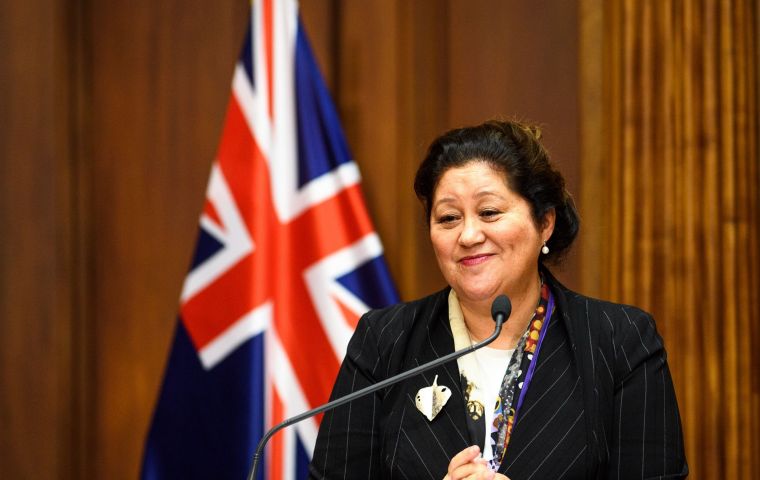MercoPress. South Atlantic News Agency
Kiwi lawmakers want country's name changed to Aotearoa
 The country already has a Maori-ethnicity Governor-General: Dame Cynthia Alcyion Kiro since 2021.
The country already has a Maori-ethnicity Governor-General: Dame Cynthia Alcyion Kiro since 2021. A group of New Zealand lawmakers mooted for the country to be renamed Aotearoa, which would much better reflect its Maori ancestry, and the Wall Street Journal has picked up on their bid this week.
It is not the first initiative of this kind. There have been several petitions and attempts, including a request in 1895 to officially adopt “Māoriland,” which was already an unofficial name for the country.
The campaign is being advanced by the Maori Party, on the grounds that the current name dates back to a time of colonization. The word “Aotearoa” refers to the clouds that orally transmitted indigenous history and helped the first Polynesian navigators reach the country. It is not yet clear if the Maori had a name for the entire country before the arrival of the Europeans. According to historians, Aotearoa originally referred only to the North Island. Renaming the country “The Land of the Great White Cloud” might be decided through a referendum.
“We are a Polynesian country and we are Aotearoa,” the Maori Party noted last year when the signature-gathering campaign opened. ”The people of this land (Tangata Whenua) are fed up with our ancestral names being manhandled, bastardized, and ignored. We are in the 21st century, this must change,“ the Maori Party has stressed in its campaign launched on social media.
In the Maori language, Aotearoa can be divided into ”Ao” (world), “tea” (bright or white), and “roa” (long). Hence, the “long bright world” or “long white cloud.”
The first contact of the Maori with the Europeans, in 1642, resulted in four dead sailors and a retreat after a hostile reception. But the country eventually succumbed to Dutch colonization, being named Nieuw Zeeland (after the Dutch province of Zeeland), and later, when it fell into the hands of the British Empire, it was renamed New Zealand, its official name to this day.
The political initiative to rid the country of a name that harks back to its colonization past may be successful. A recent document signed by the US and New Zealand governments identified Jacinda Ardern as the Prime Minister of Aotearoa New Zealand, the Wall Street Journal reported.
The country's current Foreign Minister Nanaia Mahuta has the moko kauae, a chin tattoo reserved for women in Maori culture. Ardern's pick for the position was unprecedented.
The name-change campaign has gathered more than 70,000 signatures and will be examined by a parliamentary committee that could recommend a vote, put it to a referendum, or take no action.
“It's a reset of where we are as a nation,” said Rawiri Waititi, co-leader of the Maori Party, a small party in Parliament that supported the petition, the Wall Street Journal also reported. “There is no need to be afraid.”
Prime Minister Ardern agrees with a wider use of “Aotearoa,” but officially the government is not considering a formal change, a spokeswoman said. Ardern, who speaks Maori in some of her speeches and observes some of the traditional ceremonies, declared Maori New Year (Matariki) a national holiday earlier this year to recognize the shared identity of New Zealanders.
The country already has a Maori-ethnicity Governor-General. Dame Cynthia Alcyion Kiro took office Oct. 21, 2021, succeeding Patsy Reddy. But despite the Maori initiative, opinion polls do not show mass support for the change. More than half of those polled prefer to keep the current name, while the options of renaming it Aotearoa or the combination Aotearoa New Zealand add up to 40% in favor.
With British colonization in the 19th century, the name New Zealand was adopted, which was given by the Dutch explorer Abel Tasman in allusion to a province of the Netherlands called Zeeland.
When Abel Tasman sighted these well-populated shores in 1642, he called the place Staten Land because he believed it was somehow connected to a Staten Island in what is now Argentina. Later, a Dutch East India Company cartographer gave it the name Nieuw Zeeland (or Nova Zeelandia in Latin). “Zee” in Dutch translates as “sea”, and its etymology in English is complicated. In northern European languages Sjælland described a place closely linked to the sea.
The country was named after Zeeland in the southwest of the Netherlands. Early Dutch explorers also called the forts of present-day Taiwan and Guyana Zeelandia. But when James Cook arrived in 1769, Nieuw Zeeland was anglicized into New Zealand and Te Moana-o-Raukawa became Cook Strait.




Top Comments
Disclaimer & comment rules-

Read all commentsTime for a campaign to re-name Patagonia, as Wallmapu.
Jul 28th, 2022 - 12:37 pm 0The Implanted Population should not be allowed to vote in the referendum, as they have no legitimate right to be there.
Commenting for this story is now closed.
If you have a Facebook account, become a fan and comment on our Facebook Page!